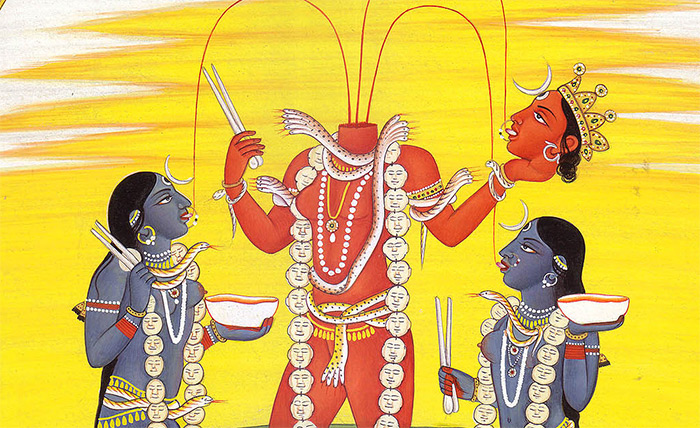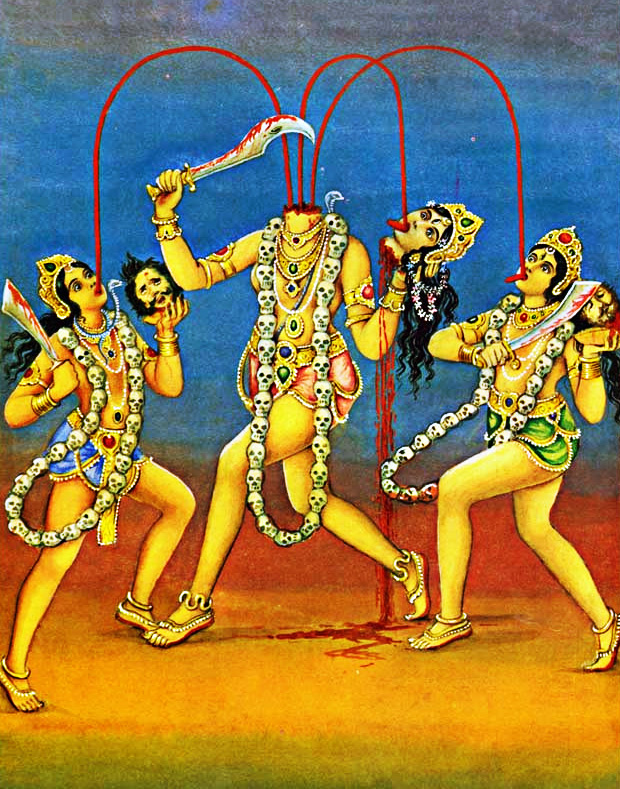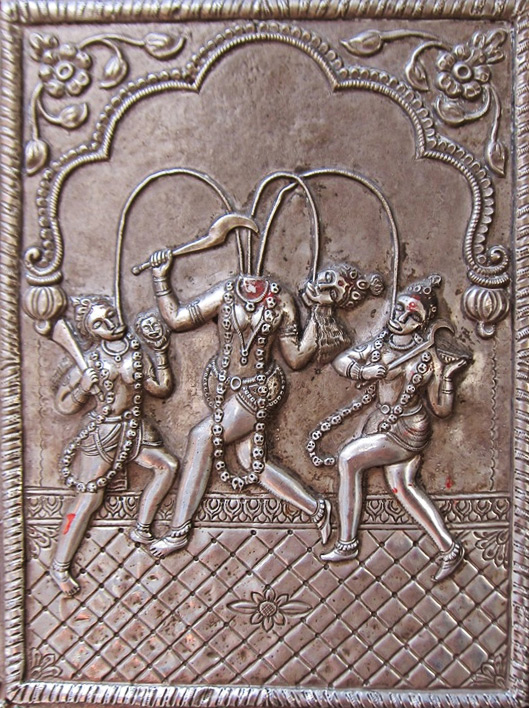Goddess Chinnamasta, The One with the Severed Head

The text of the Gupta Lalitambika desribes Goddess Chinnamasta as follows: “She who is the embodiment of virtue, love, humanness, anger, valiancy, terror, odiousness, mysticism, humor and tranquility all put together.” It is quite a neat description of the Goddess. The name by itself connotes ‘one with the severed head’. She is refered as Prasanda Chandika and comes 6th in line of the ten Mahavidyas. There is mention of the Goddess in not only Hindu texts but also Buddhist Tantric scriptures. She is also called Vajreshwari and is likened to the thunderbolt of Lord Indra. Her eyes are expressive and some devotees also call her Indrani. Those who follow her become inspired and courageous.
Significance of Mahavidya Chinnamasta
She is known to help the activation of the Manipur chakra in the human body. As the chakra gets started a white odorless smoke is emitted. A triangle and a lotus emerge. It also brings forth the images of Rati and Manmata who are just above the white lotus. Manmata has his back on the white lotus and Rati is positioned just above him. The image also depicts Cinnamasta standing on the chest of Manmata. She has a head in her hand. Her neck shows three sprays of blood spouting out (symbolizing the flow of prana through Ida, Pingala and Sushumna Nadis). One spray of blood is towards her friend Dakini and the other is for Varninini. The third one, which is green and yellowish, is gaseous in nature. It assumes an ultra violet shade and comes out of her mouth. This gas is spread all across the universe. It intersperses with all living beings and touches their lives.
The Devi is harsh on her self as she sacrifices her head. As she has immense self-control she is considered a yogi of the finest order. Since she is able to sacrifice her own head it means she is capable of spiritual advancement.
She is called a pure Yogini. This is why she is called by names like Vajra Yogini, supreme Dakini or Para Dakini. Those who wish to get empowered with the occult worship her ardently. Her left foot is positioned in a manner that shows she is ready to move or is always ‘on the go’. In her hand she also carries a knife along with the severed head. A serpent is around her neck and she has three eyes. Despite all her fearsome features she is considered satvik and very feminine. Once she blesses the devotee he is protected for life.

Legends Associated with Mahavidya Chinnamasta
Since there are not many available texts on her and also by way of reference quite a lot has disappeared in antiquity, nevertheless through art she is well depicted. As one of the forms of Kali many fear her. In Tantric Buddhist texts she is refered as Vajrayoni and the form of Tara. Those who follow the Tibetan tantric system believe that her ability to hold her head in sacrifice shows the highest spiritual authority. Her not being dead, and walking is also amazing as mentioned in the Tibetan Tantra scriptures. This also signifies the enlighment from risen Kundalini, and complete freedom from ego
How the Mahavidya’s Qualities Concern Us?
We need to get rid of all kinds of false identifications and emotions. We have to go beyond the limitations and break free. She teaches us to remove fear, self pity and also forget the pain of death. Her being naked means she wants us also to be free from being bound by ego and false designations.

As a Mahavidya she wears a garland of skulls and a necklace of bones around her neck. She ties the snake on her neck like a yajnopavita or a sacred thread. It is gruesome to see that she has cut off her head and is carrying it in her hand. While she is standing with the severed head on Rati and Manmata, the backdrop is equally terrifying. There is thunder and lighting all around. She is in a state of amansaka (not dead). She is now free of all human emotions and characteristics. She is still happy and sees it all with her three eyes. The place where the event is happening is a cremation ground. There are jackals that are around but are not interested in the event.
There is another image of the Mahavidya where she is sitting on the chest of Shiva with her severed head. She is also called the red hibiscus and she is like the rising sun. She is usually in red and at times blue. In another image she is riding the lion with her severed head. The rest of the features of the Mahavidya remain the same. In the oldest tradition she stands naked like a Digambari. There is no illusion of the body or attachment towards it. With her in such images there is hardly any reason for her devotees to fear life or death. They are also stripped of illusion. Her acts are heroic in nature. She is in bliss and not in pain

Source: indiadivine
This post is for sharing knowledge only, no intention to violate any copy rights

The text of the Gupta Lalitambika desribes Goddess Chinnamasta as follows: “She who is the embodiment of virtue, love, humanness, anger, valiancy, terror, odiousness, mysticism, humor and tranquility all put together.” It is quite a neat description of the Goddess. The name by itself connotes ‘one with the severed head’. She is refered as Prasanda Chandika and comes 6th in line of the ten Mahavidyas. There is mention of the Goddess in not only Hindu texts but also Buddhist Tantric scriptures. She is also called Vajreshwari and is likened to the thunderbolt of Lord Indra. Her eyes are expressive and some devotees also call her Indrani. Those who follow her become inspired and courageous.
Significance of Mahavidya Chinnamasta
She is known to help the activation of the Manipur chakra in the human body. As the chakra gets started a white odorless smoke is emitted. A triangle and a lotus emerge. It also brings forth the images of Rati and Manmata who are just above the white lotus. Manmata has his back on the white lotus and Rati is positioned just above him. The image also depicts Cinnamasta standing on the chest of Manmata. She has a head in her hand. Her neck shows three sprays of blood spouting out (symbolizing the flow of prana through Ida, Pingala and Sushumna Nadis). One spray of blood is towards her friend Dakini and the other is for Varninini. The third one, which is green and yellowish, is gaseous in nature. It assumes an ultra violet shade and comes out of her mouth. This gas is spread all across the universe. It intersperses with all living beings and touches their lives.
The Devi is harsh on her self as she sacrifices her head. As she has immense self-control she is considered a yogi of the finest order. Since she is able to sacrifice her own head it means she is capable of spiritual advancement.
She is called a pure Yogini. This is why she is called by names like Vajra Yogini, supreme Dakini or Para Dakini. Those who wish to get empowered with the occult worship her ardently. Her left foot is positioned in a manner that shows she is ready to move or is always ‘on the go’. In her hand she also carries a knife along with the severed head. A serpent is around her neck and she has three eyes. Despite all her fearsome features she is considered satvik and very feminine. Once she blesses the devotee he is protected for life.

Legends Associated with Mahavidya Chinnamasta
Since there are not many available texts on her and also by way of reference quite a lot has disappeared in antiquity, nevertheless through art she is well depicted. As one of the forms of Kali many fear her. In Tantric Buddhist texts she is refered as Vajrayoni and the form of Tara. Those who follow the Tibetan tantric system believe that her ability to hold her head in sacrifice shows the highest spiritual authority. Her not being dead, and walking is also amazing as mentioned in the Tibetan Tantra scriptures. This also signifies the enlighment from risen Kundalini, and complete freedom from ego
How the Mahavidya’s Qualities Concern Us?
We need to get rid of all kinds of false identifications and emotions. We have to go beyond the limitations and break free. She teaches us to remove fear, self pity and also forget the pain of death. Her being naked means she wants us also to be free from being bound by ego and false designations.

As a Mahavidya she wears a garland of skulls and a necklace of bones around her neck. She ties the snake on her neck like a yajnopavita or a sacred thread. It is gruesome to see that she has cut off her head and is carrying it in her hand. While she is standing with the severed head on Rati and Manmata, the backdrop is equally terrifying. There is thunder and lighting all around. She is in a state of amansaka (not dead). She is now free of all human emotions and characteristics. She is still happy and sees it all with her three eyes. The place where the event is happening is a cremation ground. There are jackals that are around but are not interested in the event.
There is another image of the Mahavidya where she is sitting on the chest of Shiva with her severed head. She is also called the red hibiscus and she is like the rising sun. She is usually in red and at times blue. In another image she is riding the lion with her severed head. The rest of the features of the Mahavidya remain the same. In the oldest tradition she stands naked like a Digambari. There is no illusion of the body or attachment towards it. With her in such images there is hardly any reason for her devotees to fear life or death. They are also stripped of illusion. Her acts are heroic in nature. She is in bliss and not in pain

Source: indiadivine
This post is for sharing knowledge only, no intention to violate any copy rights